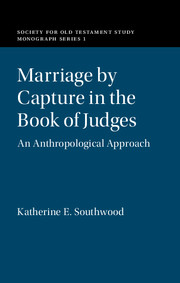Book contents
- Frontmatter
- Contents
- Preface
- 1 Methods, Considerations and Recent Approaches to Judges 21
- 2 Contextualised Outline of the Causes for and Consequences of Marriage by Capture
- 3 Virginity, Marriage and Rape in the Hebrew Bible
- 4 Judges 21 as an Example of Marriage by Capture in the Hebrew Bible
- 5 Marriage by Capture within an Ethnic Narrative: Judges 21 as a Social Critique of Superficial Unity in the Persian Period
- Conclusion
- Bibliography
- Author Index
- Thematic Index
4 - Judges 21 as an Example of Marriage by Capture in the Hebrew Bible
Published online by Cambridge University Press: 30 March 2017
- Frontmatter
- Contents
- Preface
- 1 Methods, Considerations and Recent Approaches to Judges 21
- 2 Contextualised Outline of the Causes for and Consequences of Marriage by Capture
- 3 Virginity, Marriage and Rape in the Hebrew Bible
- 4 Judges 21 as an Example of Marriage by Capture in the Hebrew Bible
- 5 Marriage by Capture within an Ethnic Narrative: Judges 21 as a Social Critique of Superficial Unity in the Persian Period
- Conclusion
- Bibliography
- Author Index
- Thematic Index
Summary
Having analysed in detail the practice of marriage by capture, the factors within the marriage system which allow it to function and the outcomes of the practice, and having examined rape, virginity and marriage within the Hebrew Bible, we observed that many of the features of the marriage system which occurred within the Biblical material correlated with marriage systems wherein marriage by capture occurs. These included arranged marriages, bride-price, patriarchal organisation, stigma on sexual activity outside of marriage, and connections between female sexual modesty and male honour. However, none of the examples which we evaluated could be understood as examples of marriage by capture. Nevertheless, the texts discussed and analysed do provide a touchstone, of sorts, for the various expectations concerning marriage that early receivers of Judges 21 may have had. As has been demonstrated, virginity would have been highly prized and once virginity was lost, a woman would be lucky to be married. As a consequence of losing her virginity, the social and economic status of the entire household would be lowered and the woman's father dishonoured. Other important observations which emerged from reviewing some of the biblical and extra-biblical material concerning rape, virginity and marriage were the array of loaded terms which existed to describe sexual violation and, in particular, the emic view of virginity which was expressed in some of the biblical material as ethnically neutral territory. This analysis now leads us to a position from where Judges 21 may be evaluated in detail.
The ‘Ban’: War and Virgins
The initial episode of finding wives for Benjamin looks, at first glance, somewhat similar to the configuration of the ‘ban’ which occurs in Numbers 31.
‘Go, put the inhabitants of Jabesh-gilead to the sword, including the women אשה and the little ones טף. This is what you shall do; every male זכר and every woman אשה that has lain with a male זכר משכב + ידע you shall devote to destruction חרם.’ And they found among the inhabitants of Jabesh-gilead four hundred young virgins בתולה who had never slept with a man זכר משכב + איש ידע לא and brought them to the camp at Shiloh, which is in the land of Canaan.
(Judg. 21:10–12)- Type
- Chapter
- Information
- Marriage by Capture in the Book of JudgesAn Anthropological Approach, pp. 146 - 188Publisher: Cambridge University PressPrint publication year: 2017



